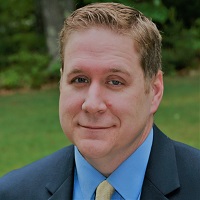Sponsors fellowship opportunities, annual Honors Colloquium
URI Professor Marc Hutchison pulls double duty as the Chair of the Political Science Department and Director of the John Hazen White Sr. Center for Ethics and Public Service. Photo from uri.edu
The John Hazen White Sr. Center for Ethics and Public Service is looking to expand its initiatives to better serve students at the University of Rhode Island and the local community.
According to Marc Hutchison, the director of the Center and chair of the political science department at the University of Rhode Island, the mission of the organization is to promote and train people on ethics and supporting public service.
It was first established in 1995 with the intent of helping to provide ethics training workshops to Rhode Island state employees, but since then, the state has begun providing its own ethics training to employees.
“We needed to pivot [into a] new direction and we’ve been doing that,” Hutchison said. “I’ve taken on the directorship to kind of reorient the Center within its mission to try and think about what we’re doing now in the 21st century… It’s an exciting time in the Center.”
Hutchison has served as director for the past two years. One of the major ways Hutchison said the Center is looking to put its name out there is by getting more involved in the Honors Colloquium. Cheryl Foster, the associate director of the URI Honors Program, has been involved with the Center since its founding. She said that it has an ongoing commitment with the Honors Colloquium to sponsor one speaker during each series.
“So much has changed in society in the last few years that we thought this was a good time to really step back and really look at who you are is now, what our students are like today and what the interface between the public good and the role of the URI students would be going forward,” Foster said.
The Center has also been increasingly involved in further developing URI’s curriculum to reflect its values of ethics and public service. Foster said that a great example of this has been the grand challenge courses that URI requires as a part of general education requirements.
Foster said the biggest evolution the program has had since its founding is that it is far more inclusive of the student side of ethics and public service than it was at the beginning.
The Center is also partnering with the Rhode Island Ethics Commission to create a research fellowship for students to take part in, according to Hutchison. While this is an unpaid internship, students will receive a $5,000 stipend from the Center for their participation.
He also talked about other upcoming programs from the Center, including continuing faculty workshops to help faculty members with implementing ethics and public service into their curriculums. They will be funding these workshops for the next two summers at least.
Hutchison said that despite requiring faculty members to implement ethics and public service into their curriculum, many faculty members had not done a good job integrating these into their courses. According to him, that is why these faculty workshops were designed.
Foster said that organizations like the Center are important for society because as they practice what bigger institutions preach.
“I think it’s quite common for people to pay lip service to things like ethics and being a good citizen,” she said. “We see that all the time, people have mission statements and people put out big statements and it’s all very impressive. We’re actually providing vectors for people to enact ethical behaviors, and to enact being a good citizen by volunteering or engaging in public service. And I’m really proud of that.”

